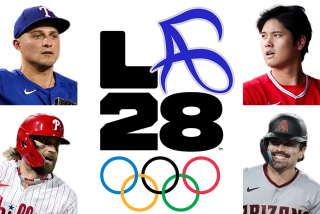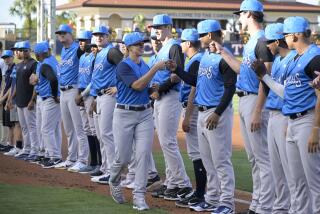Q & A
- Share via
Questions and answers about baseball’s labor dispute:
Q: What did the players do Friday?
A: Their executive board voted, 57-0, to strike Aug. 30 if there isn’t an agreement by then.
Q: What is the likelihood that a settlement will be reached without a strike?
A: Better than in previous disputes. The sides have narrowed their differences in recent weeks.
Q: What is the track record of baseball labor disputes?
A: Eight negotiations, eight work stoppages since 1972.
Q: Why set a strike date now?
A: Players are convinced that if they finish the season without an agreement, owners would lock them out (which NBA owners did to their players) or change work rules. The union prefers to have any confrontation late in the season, when owners take in more revenue.
Q: What is the biggest obstacle to a settlement?
A: Only one--the luxury tax. Players want high-spending teams to face a higher threshold before a tax kicks in and a lower tax rate. Owners want the tax to restrain spending to improve competitive balance. Players look at it as a device, along with revenue sharing, to transfer money from high-revenue teams to the other clubs. Player say that a steep tax, along with revenue sharing, would act as a salary cap, which owners deny.
Q: At what point are the playoffs and World Series threatened?
A: An agreement probably would have to be reached by Sept. 6 at the latest to have any chance of preserving the 162-game schedule, and by mid-September to save the playoffs.
Q: What would happen to the pennant races and postseason play if the regular season is shortened?
A: Any changes to the schedule and postseason format would have to be negotiated
Q: Which player would lose the most?
A: Texas shortstop Alex Rodriguez, who has a $21-million base salary this year, would lose $114,754.10 per day, a total of $3,557,377.
Q: What happens if there isn’t a settlement in time to save the season?
A: That’s what happened in 1994. The sides didn’t resume substantive negotiations until November. They negotiated through March and the strike ended only after the National Labor Relations Board issued an unfair labor practice complaint against owners and a federal judge issued an injunction restoring the rules of the expired contract.
More to Read
Go beyond the scoreboard
Get the latest on L.A.'s teams in the daily Sports Report newsletter.
You may occasionally receive promotional content from the Los Angeles Times.










